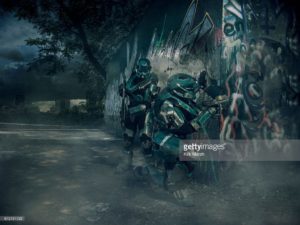Happy Monday! Today we have a first page critique from a dystopian novel – the extract we have is from a chapter entitled Gideon so I’m not sure if this is the first page to the novel itself or merely to a later chapter. The author who submitted this also provided an overview of the dystopian world he/she has created but I’m just going to focus on the page itself – as this is typically how a reader would first immerse themselves in the world (and we at TKZ don’t typically go through a synopsis or overview for the pages we review). Suffice to say this novel takes place in the near future after a Third World War that has obliterated civilization in a nuclear strike. My comments follow after the extract but I do think this first page critique illustrates the need for clear, consistent world building for any novel that relies on a futuristic or alternative world that is unfamiliar to a reader.
Gideon
On his way to his scheduled fear desensitization treatment at the House of Pain, Gideon Guidry and his friend Paul Roseau had stopped at the Iron Byrd Tavern, where Gideon’s friend Paul, who had made several visits himself, felt sympathy for poor Gideon had purchased several large pink glasses of Le Grand Courage, a rare and expensive French wine for him, and began slurring his words, as the two shared the wine and sat discussing Gideon’s pending appointment and possible death sentence.
Gideon gulped the wine as if he had spent the day in the desert without liquids and as if wine would never be available again, to bolster up his courage for the day ahead.
Paul said, “You know they steal your memories and sell them to those rich citizens up on the Excelsior level of Sanitorium.”
“No, you must be kidding. They wouldn’t dare.
“They would, and they do. “Paul said.
“And people go along with this? “asked Gideon.
“Either the poor subversives don’t realize it is happening to them, or they just pretending it isn’t happening to them. No one has the courage to face the whip on Public Punishment Day. So, there really is no way, you can avoid the treatment. Why not fake an illness? ”Paul suggested, Gideon just shook his shoulders and said, “There is no point in putting it off. They will get me eventually and then I’ll be in the punishment square. Might as well get the dammed thing over. Right?”
“No, OK, maybe. Well, let’s at least meet up tomorrow anyway and you can tell me how it went. My prayers are with you, my old friend.”
Now Gideon was like a bull seeing red, as hate poured over Gideon’s soul like hot grease on a cook stove, imaginary smoke came out of his ears, as he stood there his hands shaking, his fist balled up tight, as he faced this indignity stoically and stood in front of the old converted psychiatric hospital. Surprisingly, near the front entrance, he saw a large pile of rotted timbers stacked neatly up against the sleek new part of the House of Pain and thought, I wonder what that stuff is for? Then, he thought, oh, I hope it is not what I think it is?
Then, Gideon thought, Am I Drunk enough? Am I strong enough? To hide the deep dark secret.
My Comments
As always, bravo to our brave submitter for providing us with an extract of his/her work to review. Even though I don’t typically write these sorts of novels, I’m a huge fan of works that fall in both the dystopian and science-fiction genre (which this clearly seems to do). When reading these genres, I look for the following: (1) novelty and clarity in world building; (2) an immersive experience that surprises or shocks me with details or events and; (3) something unique that sets apart the world from others I’ve read. Given how many novels have been set in a post-apocalyptic world it is very difficult to achieve all three.
Rather than providing an overview as I usually do followed by specific comments, this time I’m going to provide notes embedded in the extract itself – in bold and italics – as I think this is a more effective approach.
Extract with my notes:
On his way to his scheduled fear desensitization treatment at the House of Pain, Gideon Guidry and his friend Paul Roseau had stopped at the Iron Byrd Tavern, where Gideon’s friend Paul, who had made several visits himself, felt sympathy for poor Gideon had purchased several large pink glasses of Le Grand Courage, a rare and expensive French wine for him, and began slurring his words, as the two shared the wine and sat discussing Gideon’s pending appointment and possible death sentence.
This sentence is far too long and unweildy. The use of ‘had’ seems redundant in the use of the past tense. The ‘House of Pain’ and ‘fear desensitization treatment’ kind of make sense but when we learn that this appears to be a public whipping I’m not sure what the purpose of this treatment really is….or why this might be a death sentence. The world I’m expected to suspend disbelief and inhabit doesn’t seem entirely consistent. The description of a tavern in particular is hard to reconcile in a more sci-fi post apocalyptic world (sounds more fantasy/middle ages). I need to believe that this world has ‘taverns’ and pink French wine called ‘Le Grand Courage’ even if it also sounds pseudo science-fiction.
Gideon gulped the wine as if he had spent the day in the desert without liquids and as if wine would never be available again, to bolster up his courage for the day ahead.
Gulping wine as if ‘he had spent a day in the desert without liquids’ and ‘as if wine would never be available again’ and ‘to bolster up his courage’ is too much – one of these reasons would have been fine and I’m also confused: In this post apocalyptic world, why is wine available? Are there still deserts even?
Paul said, “You know they steal your memories and sell them to those rich citizens up on the Excelsior level of Sanitorium.”
More confusion – so do they steal the memories of pain/fear desensitization treatment? If so, why would rich citizens want them? If they are stealing other memories, how and why does this occur and how does this fit into the discussion of what is going to happen to Gideon at the House of Pain?
“No, you must be kidding. They wouldn’t dare.
“They would, and they do. “Paul said.
“And people go along with this? “asked Gideon.
“Either the poor subversives don’t realize it is happening to them, or they just pretending it isn’t happening to them. No one has the courage to face the whip on Public Punishment Day. So, there really is no way, you can avoid the treatment.
This makes it sound like the memories are of the whipping – but how does Public Punishment Day relate to the House of Pain/Fear desensitization treatment? Again, I’m confused as to what this discussion is really about. Would Gideon really think people might go along with having their memories stolen? Why are we now talking about subversives when before it sounded like everyone went to the House of Pain for treatment (Paul, after all, had already made several visits). Also, why in a dystopian world wouldn’t ‘they dare’ steal memories (I mean they are happy to whip people in public…)
Why not fake an illness? ”Paul suggested, Gideon just shook his shoulders and said, “There is no point in putting it off. They will get me eventually and then I’ll be in the punishment square. Might as well get the dammed thing over. Right?”
“No, OK, maybe. Well, let’s at least meet up tomorrow anyway and you can tell me how it went. My prayers are with you, my old friend.”
So you can avoid treatment by faking an illness? Seems incongruous for a society/government that inflicts treatment at the ‘House of Pain’ to allow people to delay just because they don’t feel well…again this goes to presenting a consistent and authentic feeling world for a reader. If a reader is confused or has to ask these questions, then the world building isn’t clear.
Also, it seems very strange that Paul which say ‘let’s meet up tomorrow and you can tell me how it went’ when he’s already endured ‘several visits’ to the House of Pain. Not only does this minimize what was described in the first paragraph as a ‘possible death sentence’ it also robs the scene of dramatic tension.
Finally, there is a missing quotation mark before Paul’s comment. As we always emphasize here at the TKZ, an author must go over his/her work to ensure it is error and typo free before sending it to an agent or editor.
Now Gideon was like a bull seeing red, as hate poured over Gideon’s soul like hot grease on a cook stove, imaginary smoke came out of his ears, as he stood there his hands shaking, his fist balled up tight, as he faced this indignity stoically and stood in front of the old converted psychiatric hospital.
Notes: Again, way too many descriptions/similes going on here – to the point where it almost seems humorous…and how did he get from the tavern to standing in front of an old converted psychiatric hospital (which I’m assuming is part of the House of Pain)?
Surprisingly, near the front entrance, he saw a large pile of rotted timbers stacked neatly up against the sleek new part of the House of Pain and thought, I wonder what that stuff is for? Then, he thought, oh, I hope it is not what I think it is?
Then, Gideon thought, Am I Drunk enough? Am I strong enough? To hide the deep dark secret.
I’m confused as to what the pile of rotting timbers were for – a hanging? A funeral pyre? Again, the punishments inflicted in this society sound more medieval that future/post apocalyptic so it is vital that this world is described in a way that the reader believes it has sunk back into medieval style punishments (which doesn’t seem to fit with having the technology available to steal people’s memories…). The final line also isn’t clear as we have been given no sense up to this point that Gideon is hiding any dark secret.
Final Comments
Overall, my key concern here is world building consistency – especially in a genre that necessitates something different/unique to set it apart from all the other dystopian worlds out there. The writing could easily be tightened up but this dystopian world has to be clear to both the author and the reader. Believe me, I know how hard it is to create a world and to ensure all the elements are there on the page, rather than just in your head – but in this genre it is critical.
So TKZers, what comments do you have for our brave submitter?







